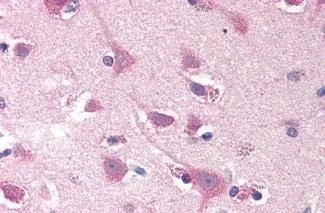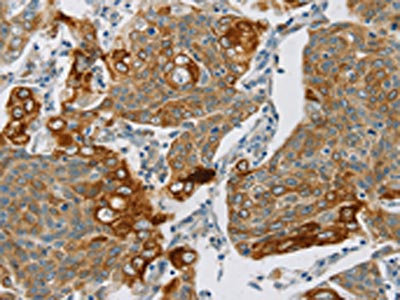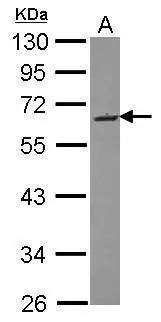
IHC-P analysis of human brain, cortex tissue using GTX85703 SMOC2 antibody. Antigen retrieval : Heat-induced antigen retrieval Dilution : 20 μg/ml
SMOC2 antibody
GTX85703
ApplicationsWestern Blot, ELISA, ImmunoHistoChemistry, ImmunoHistoChemistry Paraffin
Product group Antibodies
ReactivityHuman
TargetSMOC2
Overview
- SupplierGeneTex
- Product NameSMOC2 antibody
- Delivery Days Customer9
- Application Supplier NoteWB: 1 microg/ml. IHC-P: 20 microg/ml. ELISA: 1 microg/ml. *Optimal dilutions/concentrations should be determined by the researcher.Not tested in other applications.
- ApplicationsWestern Blot, ELISA, ImmunoHistoChemistry, ImmunoHistoChemistry Paraffin
- CertificationResearch Use Only
- ClonalityPolyclonal
- Concentration0.5 mg/ml
- ConjugateUnconjugated
- Gene ID64094
- Target nameSMOC2
- Target descriptionSPARC related modular calcium binding 2
- Target synonymsDTDP1, MST117, MSTP117, MSTP140, SMAP2, bA270C4A.1, bA37D8.1, dJ421D16.1, SPARC-related modular calcium-binding protein 2, SMAP-2, SMOC-2, secreted modular calcium-binding protein 2, smooth muscle associated protein 2, thyroglobulin type-1 repeat containing protein
- HostRabbit
- IsotypeIgG
- Protein IDQ9H3U7
- Protein NameSPARC-related modular calcium-binding protein 2
- Scientific DescriptionThis gene encodes a member of the SPARC family (secreted protein acidic and rich in cysteine/osteonectin/BM-40), which are highly expressed during embryogenesis and wound healing. The gene product is a matricellular protein which promotes matrix assembly and can stimulate endothelial cell proliferation and migration, as well as angiogenic activity. Associated with pulmonary function, this secretory gene product contains a Kazal domain, two thymoglobulin type-1 domains, and two EF-hand calcium-binding domains. The encoded protein may serve as a target for controlling angiogenesis in tumor growth and myocardial ischemia. Alternative splicing results in multiple transcript variants. [provided by RefSeq, Oct 2009]
- ReactivityHuman
- Storage Instruction-20°C or -80°C,2°C to 8°C
- UNSPSC41116161



